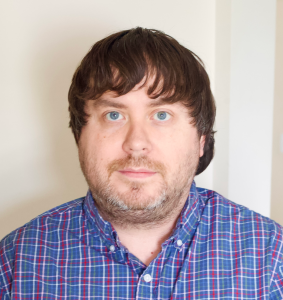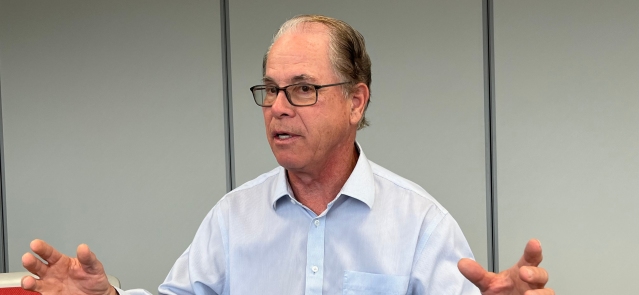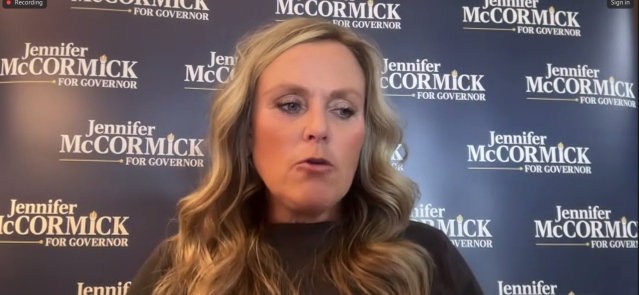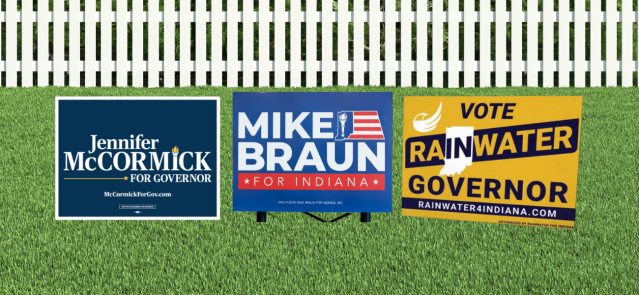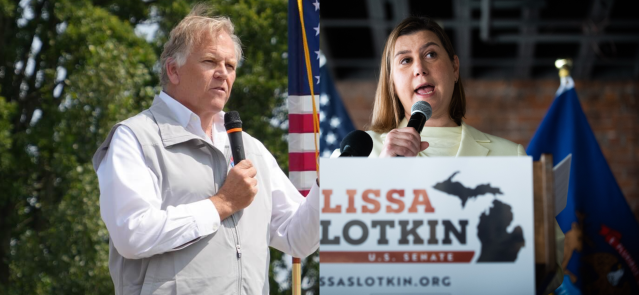Stay ahead of the curve as a political insider with deep policy analysis, daily briefings and policy-shaping tools.
Request a DemoLieutenant governor candidates talk property taxes, water and more at first debate
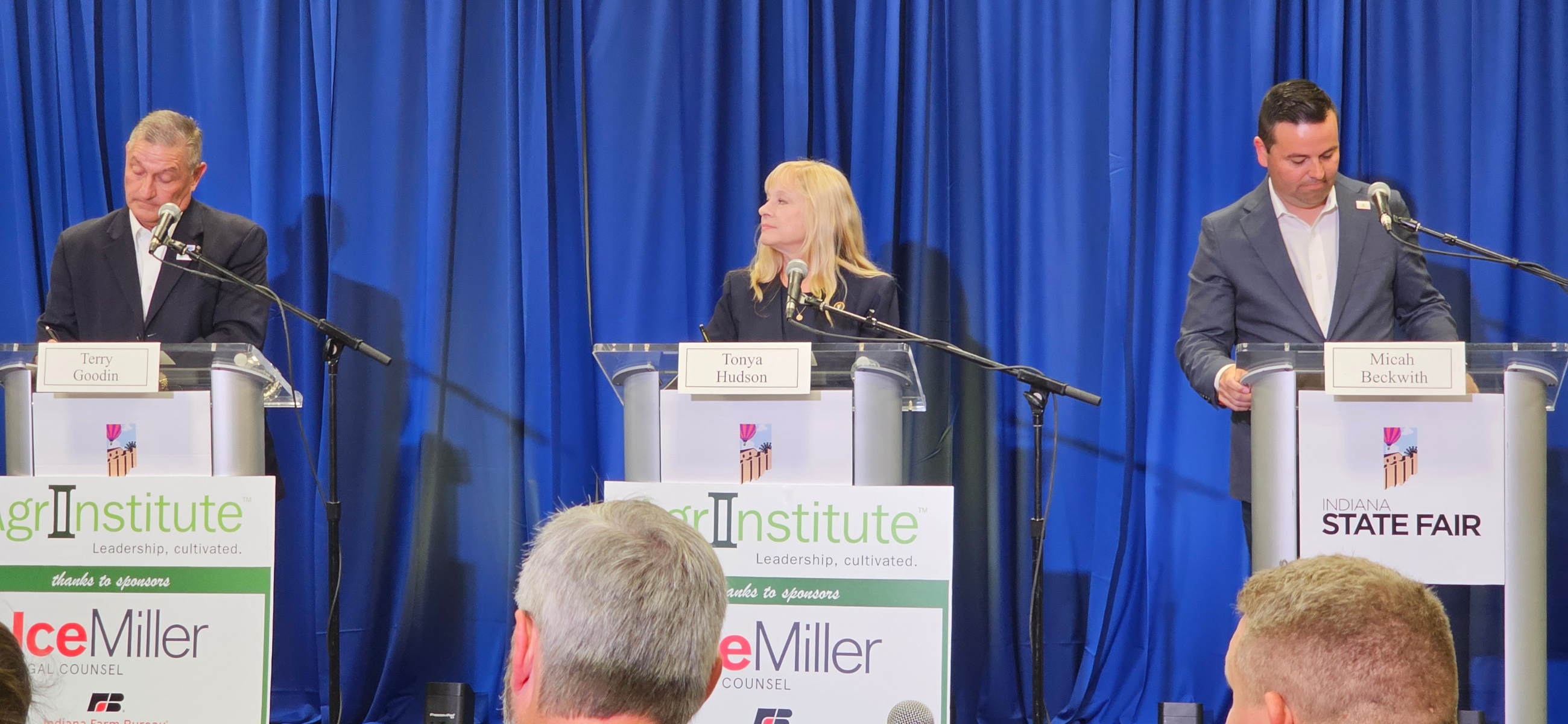
Democrat Terry Goodin, Libertarian Tonya Hudson and Republican Micah Beckwith take part in lieutenant governor candidate debate on Aug. 13, 2024, at the Indiana State Fair. (Credit: Rory Appleton)
- The Democrat, Republican and Libertarian candidates for lieutenant governor took part in their first debate
- Property taxes were also discussed at length in the first gathering of these candidates
- Other key topic areas: Land use, conservation and the Indiana Economic Development Corp.
The three candidates for Indiana lieutenant governor outlined their diverging visions on property taxes, land use, conservation and more as part of an agriculturally themed debate Tuesday at the Indiana State Fair.
Republican Micah Beckwith, Democrat Terry Goodin and Libertarian Tonya Hudson kept it civil at the hourlong contest, sticking to their allotted answer times and only rarely going back and forth in any sort of argument.
The debate, an election-year tradition at the fairgrounds, was sponsored by AgrIInstitute and centered on agriculture and rural affairs — though the participants sometimes veered into other policy lanes. It was the first time these candidates had appeared opposite one another in a debate forum this election cycle.
Here are six takeaways from the event.
It wasn’t really a debate, audience member says
George Brenner, an Indianapolis Democrat who also owns part of a southern Indiana family farm, was among the more than 100 people who packed the Purdue Extension Building.
“It was a decent Q&A session, but it was not a debate,” Brenner said of the event.
The format deviated from tradition by asking each candidate a separate question rather than having the trio react to the same line of inquiry. Although some topics would eventually be discussed by each candidate, the participants did not engage with one another’s answers.
Instead, the questions came in rapid succession from a panel of ag-focused media members.
“There was no back and forth,” Brenner said.
Property taxes take center stage
The discussion surrounding property tax reform played out in multiple questions and answers on Tuesday, with Beckwith and Hudson sharing points from their running mates’ disclosed plans and Goodin forecasting what his ticket will push for in its own yet-to-be-released proposal.
Beckwith kicked it off by saying farmers have seen a 26% increase in their property tax bill. He said the “Braun-Beckwith plan,” nodding to Republican gubernatorial candidate U.S. Sen. Mike Braun, would cap property tax increases at 3% annually.
“We’re going to make sure that never again will you be able to outpace the growth of an area with property taxes,” Beckwith said.
He added that the issue would ultimately be decided by the Legislature and called out several Republican lawmakers by name, saying Braun gave each “freedom to tackle the issue.” They were state Reps. J.D. Prescott and Jeff Thompson and state Sens. Travis Holdman and Scott Alexander.
Goodin attacked the Braun plan several times, leading moderator Gerry Dick of Inside INdiana Business to grant Beckwith the only rebuttals of the afternoon.
Goodin said the Braun proposal was a “knee-jerk reaction” that didn’t take funding local governments into account.
“Unless there was some covert reason they wanted to defund police, fire departments, ambulance services and to cut money to our local schools,” he said.
Beckwith lept in his rebuttal.
“The last time I checked, the Democrat Party was the one that wanted to defund police, not the Republican Party,” he said.
Goodin said Democratic gubernatorial candidate Jennifer McCormick will put forward a fair tax plan that seeks to keep local governments adequately funded.
Hudson said the Libertarians, led by gubernatorial candidate Donald Rainwater, would replace property taxes with a 7% sales tax paid when a home is purchased.
“If you can’t pay your property taxes, you’re kicked out of a home that you own. We should not be doing that,” Hudson said.
Beckwith takes aim at LEAP
Beckwith used several questions on water and land use to launch an assault on the Indiana Economic Development Corp., which he called a “shadow government,” and its proposed Limited Exploration Advanced Pace (LEAP) proposal in Boone County.
Beckwith echoed some legislative critics by saying the program has not been fair and transparent to local governments.
“It’s running out of control. It’s only picking winners of big corporate conglomerates … we want to see IEDC move into that smaller town,” Beckwith said.
Beckwith said Braun agreed with his criticisms.
“We’re not just going to pick one area and pour all of our resources into that area,” Beckwith said.
Goodin focuses on conservation
Goodin used several answers to focus on keeping Indiana’s water and air clean, advocating for harsher penalties for dumping chemicals into streams and rivers and signaling his support for a sales tax geared toward funding environmental protections.
He blamed Republicans, whom he said have “had 20 years of one-party rule” for lapses in the state’s environmental protections.
“They are picking winners and losers, and … they have picked conservation as one of those losers,” Goodin said.
Marijuana not mentioned, but hemp was
Marijuana legalization was not brought up, either as a question or in any answers, but Hudson advocated for greater use of hemp products.
Land use questions draw varied responses
Several questions focused on the use of farmland for solar power generation or the sale of land to developers.
“We’re seeing a hostile takeover of our farmland,” Beckwith said. He called for the state government to disincentivize the sale of farmland, particularly to out-of-state companies.
He quoted the loss of Indiana farmland at 350,000 acres and was more or less backed up by a question from the panel, which clocked the number at 345,000.
Goodin pushed a more balanced approach, saying Indiana needed to invest in agricultural education and technology to keep farms in business.
“We’ve got to work closely with our universities to move a program forward so we can make Indiana a great place to live and raise a family, and so we can become self-sufficient on energy,” Goodin said, touting his own agricultural background and noting that he still owns and works his family farm.
Hudson said farmers should be allowed to use their land however they see fit, including for solar energy collection. High income and property taxes are pushing people out of farming and the state, she added.
“Indiana has a surplus,” said Hudson. “What does that mean? They overtaxed.”
Contact Rory Appleton on X at @roryehappleton or email him at [email protected].
Know the most important news affecting Indiana
Get our free weekly newsletter that covers government, policy and politics that impact your everyday life—in 5 minutes or less.
Braun wants to push Legislature further on health care steps
Proposals from Republican gubernatorial candidate Mike Braun for addressing Indiana’s health care costs and improving access would push the Legislature to go further in some areas where it has been reluctant to do so. Braun’s proposals released Thursday argue that Indiana’s business environment is hurt by high health care costs that discourage investment. Braun called …
McCormick’s economic plan: Fewer tax breaks, greater focus on worker retention
Democratic gubernatorial nominee Jennifer McCormick proposed a retooling of the state’s budget and economic development strategy to prioritize individual Hoosiers’ needs — child care, education, health care, better maintained cities and an expanded earned income tax credit — as part of a business and economic platform rolled out Thursday morning. “Our approach is balancing that …
Indiana gubernatorial candidates lay out contrasting visions for education
Should Indiana expand the use of private school vouchers? Do teachers deserve a $60,000 salary minimum? Does state testing need to be abolished? The three candidates vying to be Indiana’s next governor have offered varied responses to these questions and others as they look to reshape the state’s education system. Here is how U.S. Sen. …
Rogers, Slotkin lean into China, national security in US Senate battle
LANSING, Mich. — Michigan voters are faced with a choice for U.S. Senate in November between two candidates with strong national security credentials but with sharply different views on how to effectively address threats to the U.S. Both Southeast Michigan candidates, Republican Mike Rogers of White Lake and Democratic U.S. Rep. Elissa Slotkin of Holly, have been …
